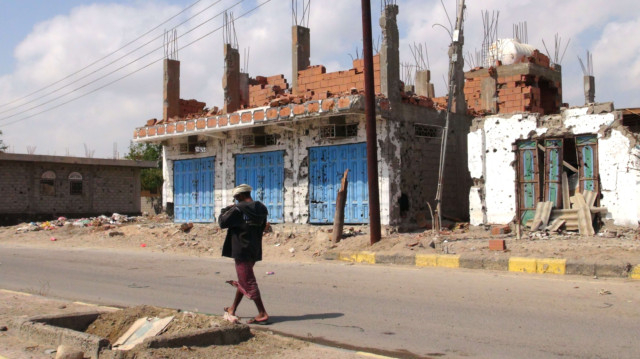
Yemen: Six months after the army drove Al Qaida militants out of Zinjibar, the southern Yemeni city lies in ruins with little law enforcement forces and poor services.
Militia members who fought alongside the army to end a year of rule by an Al Qaida offshoot currently run the show, covering a security gap left by a lack of police.
“In the absence of the government, we currently control Zinjibar and defend it,” said an armed young man manning a checkpoint in the centre of the city.
Around 300 members of the Committees of Popular Resistance have been doing the job of police since a major army offensive in June pushed Al Qaida out of the main city in Abyan province.
The Al Qaida-linked Partisans of Sharia had taken advantage of the weakness of central authority in the 2011 uprising that led to former president Ali Abdullah Saleh’s ouster, seizing control of Zinjibar with other Abyan towns.
The army offensive drove out the militants from Zinjibar, but the destruction caused by the conflict is clearly evident.
Residents who fled the city of 90,000 inhabitants to neighbouring provinces during the war were horrified by the magnitude of damage they found when they came back.
“When we returned, we found our house in ruins, completely destroyed,” Mansur Haitham said, adding he ended up squatting at a local school with seven other families.
“We remain displaced in our own city,” Haitham lamented, accusing the government of “not even assessing the damage” in his neighbourhood which was a scene of fierce gunfights between extremists and Yemeni forces backed by local fighters.
A school building further down the road from Haitham’s demolished home testifies to the ferocity of the battles.
“Since our return from Aden we have tried to accommodate students from four destroyed schools in the eight rooms that remain standing in this building,” said Samira Awadh, the headmistress of Khadija School.
“Morning classes have been confined to girls, and afternoons are for the boys.”
Apart from the massive destruction, Zinjibar people face a persisting sense of insecurity.
“There is no security in Zinjibar,” said Umm Monia, as she waited for her daughter outside the school. “We are very worried because the state is absent.”
Jameel Al Aqel, the city mayor, blames the interior ministry for Zinjibar’s present grievances.
“Citizens do not feel secure... the interior ministry is not doing its job despite our repeated calls,” he said, pointing out that insecurity was blocking other public services from restarting.
Al Aqel said that despite hurdles the local council had managed to reconnect public services like power, telecommunications and water.
He further said that people who lost their property were being housed in public buildings or camps, aided by the local militia whose members were paid by the ministry of defence.
Despite these hardships, Al Aqel sounded confident that Zinjibar had been freed of Al Qaida but said that the group could always launch attacks against the city.
“Al Qaida is no longer present in Zinjibar. I do not think the network would ever be back, but it might be able to launch attacks,” the mayor said.
Tales of horror unleashed by Al Qaida militants still haunt Zinjibar residents.
“Al Qaida destroyed my life,” said Khalid Saeed whose right hand was chopped for “theft and spying” by extremists who enforced their version of Islamist rule in the city.
“I was anaesthetised. Three hours later I woke up to find that my hand was gone. I screamed endlessly. I couldn’t believe what I saw,” Saeed said.












